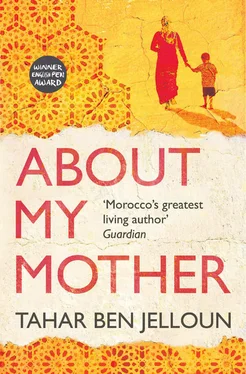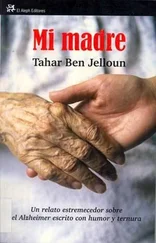When you love your parents, you don’t get rid of them. I remember a scene from an Italian comedy in which Alberto Sordi takes his elderly mother out in his new car, its seats still covered in plastic. He buys her an ice-cream and promises her a lovely drive. Unused to such solicitude from her self-centred, rather awful son, she’s obviously worried. She realises he’s taking her to an old people’s home. Which he does — cynically, cruelly, and smiling throughout. This contemptible son leaves with the tiniest twinge of conscience, a sadness that lasts no more than a moment. We, the audience, were choked. I identified with the poor old woman: my eyes filled with tears. Then I tried to put myself in the son’s shoes, and I felt sick. Yet this scene has become routine, is the norm in the west. People are no longer indignant: it’s just the way things are. They blame lack of space, lack of time. They take refuge in easy selfishness, which these same parents will pass on to their children: the wheel keeps turning in the eternal cycle of a modernity that will sacrifice old people even as it seeks to prolong their life expectancy. This paradox is the inevitable result of a society in which the only values celebrated and protected are those of the market.
Morocco, which has been influenced by the European lifestyle, will resist. Perhaps it won’t build old people’s homes. One day, probably in the distant future, a young, dynamic property developer will build a complex of small houses for the elderly. He’ll present it with panache: ‘Our parents deserve to be taken care of — not just any old how, we’re not having them sleep in with the children — they deserve comfort and calm. They’ll be happy in these apartments, designed specially for those who wish to grow old in peace. Which doesn’t mean they’ll be forgotten, oh no, not at all. I am myself a child whose success has only been possible because of his parents’ blessing. No, we’re going to look after them: a trained nurse will visit, an experienced doctor too — they’ll have everything to hand. In their twilight years, our parents will enjoy peace of mind and conditions of material comfort that are second to none …’
And he’ll find a few unscrupulous offspring to buy into his vision. Fashion and selfishness will do the rest.
One morning, I took advantage of a lucid interval to ask my mother what she thought of the practice.
‘You mean I wouldn’t live in my own house any more?’
‘You’d be in a house where specially trained people would look after you. You’d lack for nothing — you’d have doctors close at hand, and your nurse, and your children would come and see you from time to time.’
‘From time to time? That means the time would be counted. But what about Keltum, who’s been with me for fifteen years, she’d be there, wouldn’t she?’
‘No, she’s not ill and she’s not old.’
‘And why would I want to leave here? You’re planning to sell the house? That’s what it is. You can’t wait to inherit.’
‘No, I was joking. I just wanted you to know that in other countries, like France or Spain, they put old people in special homes. I knew you’d react like that.’
‘My house is good enough for me, I don’t need a special home. I won’t ever leave it. I’ll go to my grave from this room, and then you can do what you like. You can even demolish the house, or turn it into a block of flats. But I like it here and I’m staying.’
Mother wasn’t joking. Even when she was well, she’d only reluctantly agree to go and spend a few days with her daughter in Fez or her son in Casablanca. She’s deeply attached to the house, the symbol of essential and indisputable rootedness. Whatever my father’s financial difficulties, he’d always insisted on owning his house. You can go hungry, but you mustn’t be on the streets, without a roof over your head. In Fez, growing up, everyone had to own their own house. The people who rented were from the country, they weren’t city-dwellers. I remember we used to rent out part of our house in Makhfiya to people from Fasjdid, on the outskirts of Fez. A sheet was hung in the hallway to separate the two families. We were on the ground floor and they had the upstairs and the terrace. It was a big house, but we all took care not to cause problems. We couldn’t make ends meet without the rental income. Renting rooms was frowned upon in bourgeois families, but my father wasn’t ashamed to admit that we were humble people, poor even.
Yesterday, for the first time, my mother didn’t recognise my voice on the phone, and worse, she started ranting. She took me for her younger brother, Moulay Ali, who’d died twenty years before. She was furious:
‘Aren’t you ashamed, Moulay Ali? Your sister’s ill and you’ve never come to see her? Where are you? You’re hiding! Your wife’s still giving the orders and she won’t let you come and see me. That’s not right.’
‘But Yemma, this is your son, Tahar!’
‘No, Tahar’s gone to give his daughter’s hand in marriage. He’s not in Morocco. And you, who are you? Ah, you’re Mustafa, the son who went away, who abandoned me …’
‘No, Yemma, Moulay Ali died a long time ago.’
‘Oh, I see! He died and no one told me. That’s not very nice.’
She didn’t remain a widow for long. Her uncle, Sidi Abdesslam, spoke with her father. ‘She’s so young, so innocent and beautiful, and her hands are exquisite. She mustn’t stay cloistered in your house, she should go out, accompany her mother to the weddings she’s invited to — that’s where she’ll be noticed. The other day I had a visit from Sidi Abdelkrim, a wealthy man who’s married but his wife is ill. He has four grown-up children with her, but he’s still in his prime. He asked me to approach you. He would be delighted if you offered him Lalla Fatma’s hand. I know you’ll tell me he’s old enough to be her father, that she’ll have to live with the sick woman, maybe even look after her, but let me tell you it will be quite the opposite: she’s young and beautiful, she’ll be the favourite, she’ll be the only one. The other wife, poor thing, is so ill she isn’t even aware of her surroundings. The boys are grown-up, they’re all traders and they look after Sidi Abdelkrim’s assets. What do you think? What answer should I give?’
And that was how she remarried. It was a discreet ceremony, there were no festivities. The two families gathered in Sidi Abdesslam’s big house. The aduls drew up the new marriage certificate on the same sheet of paper. After the death of Sidi Mohammed — may God bless him and show him mercy — after the end of the waiting and mourning period, after discussions between the families, Moulay Ahmed consented to give the widow Lalla Fatma in matrimony to Sidi Abdelkrim, who was already married and the father of four children. The 5,000-rial sadaqah was handed over to the father of the bride. They all agreed there should be no celebrations. The widow Lalla Fatma would move into her new husband’s house once the marriage was registered. May God Almighty protect them and give them His blessing.
Fatha.
Amen.
She moved to a different neighbourhood and it took her a while to adjust to her new life. She thought about her first husband all the time and prayed to God that her life would no longer be dogged by misfortune.
Sidi Abdelkrim treated her like a princess. He made a fuss of her, gave her servants, and asked her not to wear herself out or to go into the kitchen, which was the preserve of Ghita, the black cook brought back from Senegal by Sidi Abdelkrim’s father some time around 1915.
Pregnant again, she allowed herself to be pampered and did not exert herself. Life went quietly by. The other wife liked her and advised her on ways to please and always satisfy Sidi Abdelkrim: ‘My illness has me bedridden. These days I can hardly move. Luckily, Ghita takes good care of me: I couldn’t let the house go uncared for, every morning she comes to my room and I give her instructions. I am fond of you, you know. You’re from a very good family. Thank you for being here, for consenting to marry an older man, especially one who’s already married. It was I who asked him to find another wife, as our religion demands: that is Sharia law. I said to him, “My dear Sidi Abdelkrim, you can’t go on without a woman in your bed. God allows you up to four wives, you absolutely must remarry. If I enjoyed good health, I wouldn’t ask it of you, but like this I’m no use to you, I’m just a worthless old thing. My children have grown up — may God bless them and keep them — they won’t oppose a second marriage. Take a wife — a widow or a divorcee. Typhus has killed so many young men, there must be a pretty young widow to share my beloved husband’s bed!”
Читать дальше












